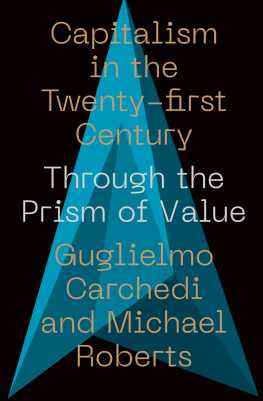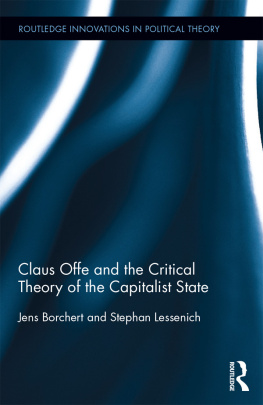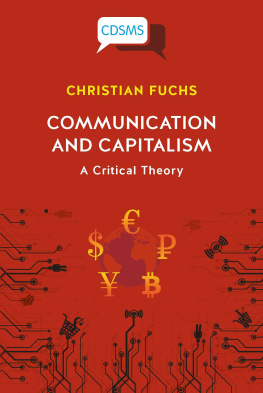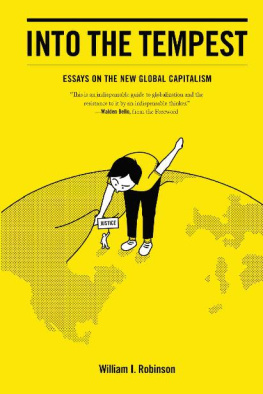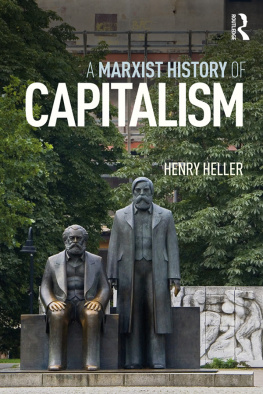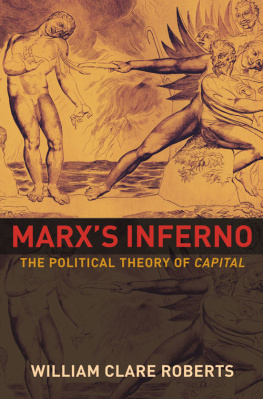Contents
Guide
Capitalism in the 21st Century
A tour-de-force of Marxist analysis; both a significant addition to the literature on Marxs theory of value and an accessible introduction to why it is essential to understanding the multiple crises of 21st-century capitalism.
Murray E.G. Smith, Professor of Sociology, Brock University
Carchedi and Roberts make killer arguments that Marxs labour theory of value is indispensable for understanding capitalisms environmental destructiveness, economic crises, impact on knowledge production, and aspects of its financial processes.
Rick Kuhn, author of the Deutscher Prize-winning Henryk Grossman and the Recovery of Marxism
Fundamental: it explains the characteristics of the current world through its most objective dimensionthe theory of valuewhich, in an anti-dialectical way, has been forgotten by the left in recent decades. In this book economics is politics and politics is economics.
Raquel Varela, author of A Peoples History of the Portuguese Revolution
This book offers a rigorous Marxist interpretation of some of the major issues in contemporary capitalism. Its analysis is firmly based on the Marxist labour theory of value and is coupled with meticulous empirical support.
Stavros Mavroudeas, Professor of Political Economy, Panteion University, Greece
Capitalism will always be capitalism, but in the 21st century new forms, controversies and challenges have appeared [] This book masterfully descends to the concrete to show the strength of Marxs law of value and the alternative socialist planning.
Juan Pablo, Professor of Applied Economics, Complutense University of Madrid
[Carchedi and Roberts are] two of the most accomplished and prominent Marxist authors.
Lefteris Tsoulfidis, Professor of Economic Thought, University of Macedonia, Greece
Brilliant Marxian theoretical and empirical analysis [] as if updating Ernest Mandels Late Capitalism for the 21st century.
Seongjin Jeong, Professor of Economics, Gyeongsang National University
Published in association with the International Initiative for Promoting Political Economy (IIPPE)

Edited by
Ben Fine (SOAS, University of London)
Dimitris Milonakis (University of Crete)
Political economy and the theory of economic and social development have long been fellow travellers, sharing an interdisciplinary and multidimensional character. Over the last 50 years, mainstream economics has become totally formalistic, attaching itself to increasingly narrow methods and techniques at the expense of other approaches. Despite this narrowness, neoclassical economics has expanded its domain of application to other social sciences, but has shown itself incapable of addressing social phenomena and coming to terms with current developments in the world economy.
With world financial crises no longer a distant memory, and neoliberal scholarship and postmodernism in retreat, prospects for political economy have strengthened. It allows constructive liaison between the dismal and other social sciences and rich potential in charting and explaining combined and uneven development.
The objective of this series is to support the revival and renewal of political economy, both in itself and in dialogue with other social sciences. Drawing on rich traditions, we invite contributions that constructively engage with heterodox economics, critically assess mainstream economics, address contemporary developments, and offer alternative policy prescriptions.
Also available
Beyond the Developmental State: Industrial Policy into the Twenty-First Century
Edited by Ben Fine, Jyoti Saraswati and Daniela Tavasci
Microeconomics:
A Critical Companion
Ben Fine
Macroeconomics:
A Critical Companion
Ben Fine and Ourania Dimakou
Money and Society:
A Critical Companion
Axel T. Paul
Dot.compradors:
Crisis and Corruption in the Indian Software Industry
Jyoti Saraswati
Capitalism in the 21st Century
Through the Prism of Value
Guglielmo Carchedi and Michael Roberts

First published 2023 by Pluto Press
New Wing, Somerset House, Strand, London WC2R 1LA and Pluto Press Inc.
1930 Village Center Circle, Ste. 3-384, Las Vegas, NV 89134
www.plutobooks.com
Copyright Guglielmo Carchedi and Michael Roberts 2023
The right of Guglielmo Carchedi and Michael Roberts to be identified as the authors of this work has been asserted in accordance with the Copyright, Designs and Patents Act 1988.
British Library Cataloguing in Publication Data
A catalogue record for this book is available from the British Library
ISBN 978 0 7453 4088 3 Paperback
ISBN 978 1 786806 96 3 PDF
ISBN 978 1 786806 97 0 EPUB
This book is printed on paper suitable for recycling and made from fully managed and sustained forest sources. Logging, pulping and manufacturing processes are expected to conform to the environmental standards of the country of origin.
Typeset by Stanford DTP Services, Northampton, England
Simultaneously printed in the United Kingdom and United States of America
Contents
Figures
Tables
Introduction
The purpose of this book is to bring to the reader a Marxist interpretation of some of the major issues in contemporary capitalism in the 21st century. We rely on the tool of Marxs value theory to deliver scientific explanations of the laws of motion in 21st century capitalism. Marxs theory of value in capitalism is the red thread running through the book.
What is value? Marx starts from the view that value is the result of the exertion of human labour. Without any exertion by humans nothing is produced that keeps human beings alive and well. So that means value is not some metaphysical abstraction, but actually physical it exists in objective reality. Think of it this way: electricity is real; it is the movement of electrons through atoms of usually copper. We cannot always see it (although we can experience its results: light, heat and shocks). And it can be measured in volts, watts and amps. Similarly, the exertion of human labour (both objective and mental) is material and so can be measured in labour time (hours, minutes etc.).
Nature also has value (to us) in that, without air, the planet, trees, forests, water etc., there would be no human life. So it has (use) value to humanity. But it requires the exertion of human labour to turn this intrinsic use value of nature into other use values for humanity: from forests to timber to houses involves the exertion of human energy (and thus labour).
Marx calls this aspect of human labour, its use value. But it is only under capitalism that the use values required and generated by human labour turn into commodities for sale on a vmarket for private profit. The results of human labour are converted into commodities which then have value with dual aspects: use value for the purchasers of those commodities and value, also called exchange value because it becomes manifest as money through exchange. These two aspects of value within the commodity reveal the basic contradiction of capitalist production ie between production for social need (use value) and for profit and the accumulation of capital (exchange value). Thats why Marx starts with the commodity in

